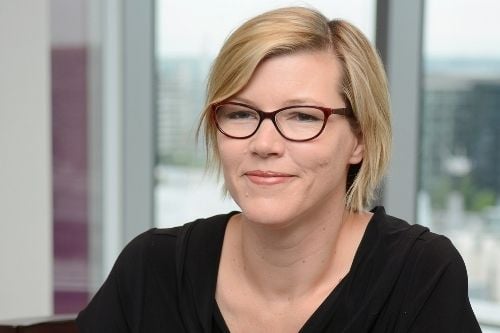

The world of entertainment has suffered since the coronavirus pandemic put a halt to productions back in March 2020. However, there are likewise other emerging risks on the horizon for media insureds that are impacting their exposures, according to one expert.
“We cover a lot of production companies who were very badly hit because the production industry went into a complete hiatus,” said Angela Weaver (pictured), focus group leader, media at Beazley, speaking about the impacts of the pandemic on the media landscape. “Similarly, with the event sector, we cover a lot of event producers and event organizers, and it goes without saying that the sector was extremely hard-hit. We saw a lot of clients not wanting to renew policies and a lot of drops in revenue.”
Nonetheless, on the other end of the media space are publishing, advertising and socially influencing insureds, and in general, those companies seemed to have fared about the same or better than before the pandemic, noted Weaver. Beazley wasn’t asked to reduce premiums more than usual on those accounts and they also didn’t experience the same fall in revenue as their production company counterparts.
In fact, looking at the media liability market more closely, the pandemic hasn’t had a significant effect, except for the fact that people are staying at home and absorbing more content. The actual top of mind issues have been developing in the media sector for some time, and are now impacting the marketplace.
“I can see areas of hardening … and I think some markets have had some quite large claims from different areas – copyright and libel are the two main ones. [Specifically,] there are some issues around fair use,” said Weaver.
Fair use allows creators to use copyrighted material, with certain rules in mind. For example, a documentary filmmaker could use certain copyrighted images in their film, provided that their use of that material is transformative, which they can achieve by commenting on it, criticizing it, or parodying it.
“There have been some quite large claims around fair use that are making the market a bit nervous, so we are seeing hardening where broadcasters or production companies or individuals are using material on a fair use basis,” explained Weaver.
Another notable development in the media liability space is that there generally have been some large losses, which in turn has meant that insurers are feeling less confident about underwriting media. Some carriers are already turning away from covering specific types of media liability.
One example that Weaver has noticed concerns non-profit organizations’ use of music, which has been in the spotlight as of late, as music companies seek out people who are infringing on their music copyright and go after them. The effect is that media liability for non-profit organizations is becoming more of an issue, Weaver told Insurance Business.
To help media insureds navigate these challenges, Beazley has a breadth of appetite that allows it to accommodate risks that may be more unusual, such as edgier or more difficult content, or perhaps a business model that’s more difficult to understand, explained Weaver.
Additionally, said the Beazley expert, “We’ve had a new policy form that we launched seven or eight months ago, and that has all the things you expect to see – libel, copyright, privacy being the main ones – but we also have contractual liability, and I put that in there because media companies may not just publish for broadcast; they may also undertake some contracted services with clients, they may organize events, they may carry out some advertising, or other types of service, and that often needs to be covered as well.”
Moreover, rather than having many different definitions of media, material, media content, and media dissemination, Weaver has aimed to make the triggers in the form very simple so that the wording is easier to understand.
And if you’re wondering whether the social media influencers who have been caught romping around Dubai would trigger coverage in a media liability policy, the answer is ‘no’ – and the same thing goes for any influencer who does something that damages their reputation or standing on social media platforms.
“We are not in the business of covering a loss of income of the influencer, but we do have an extension called brand defence, where our PR firm would help to raise the influencer back to their previous following,” explained Weaver. “They might advise them to just say nothing at all or they might advise them to issue an official statement … but we’re not covering loss of income.”
